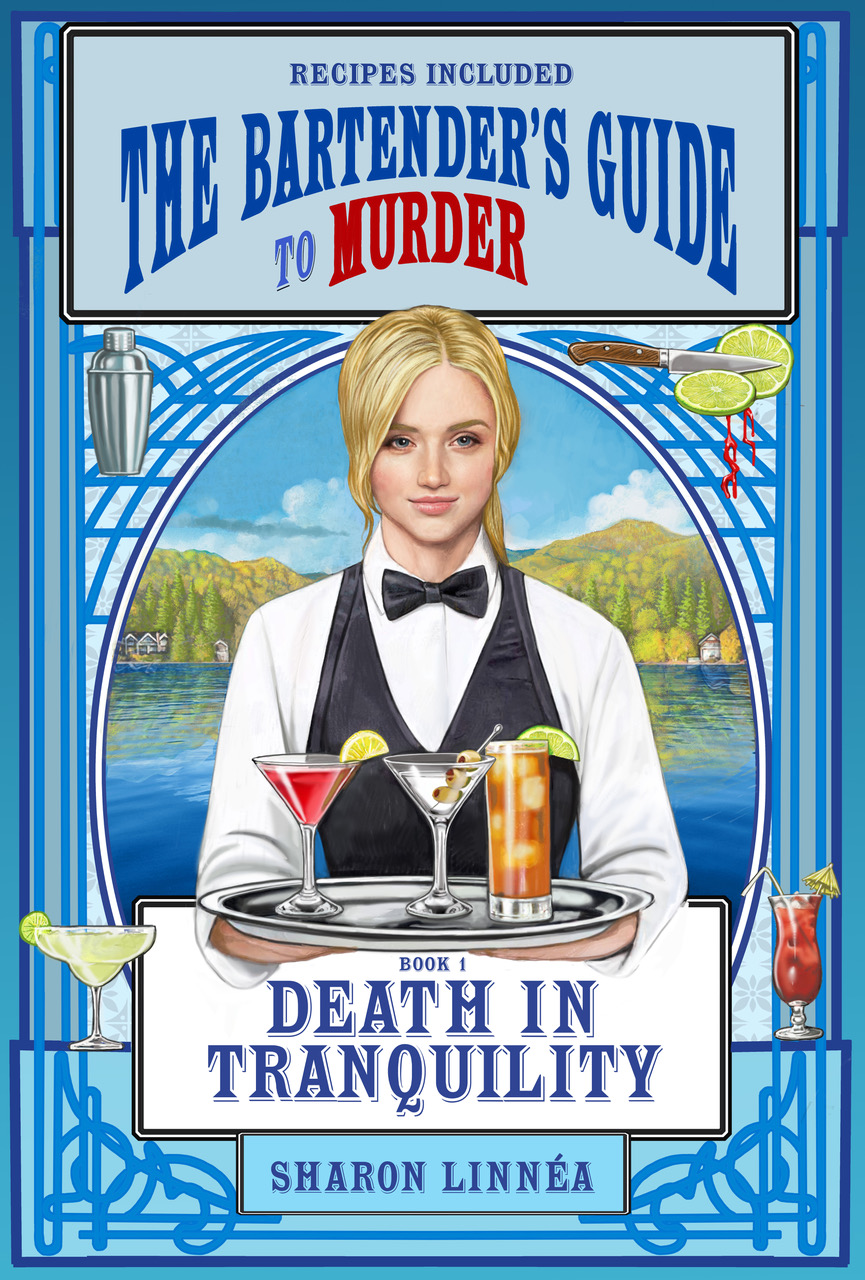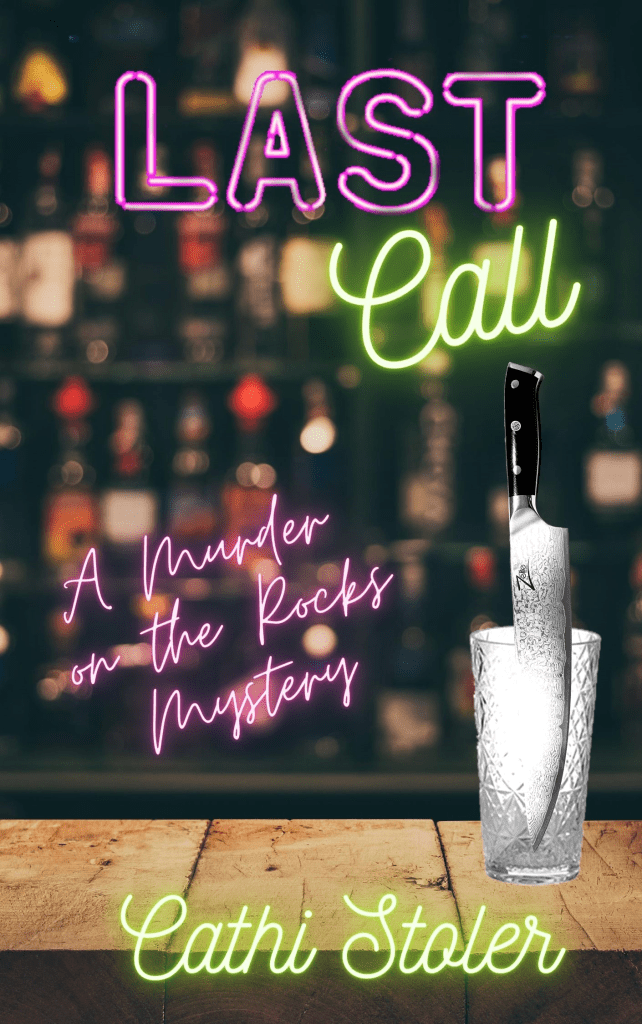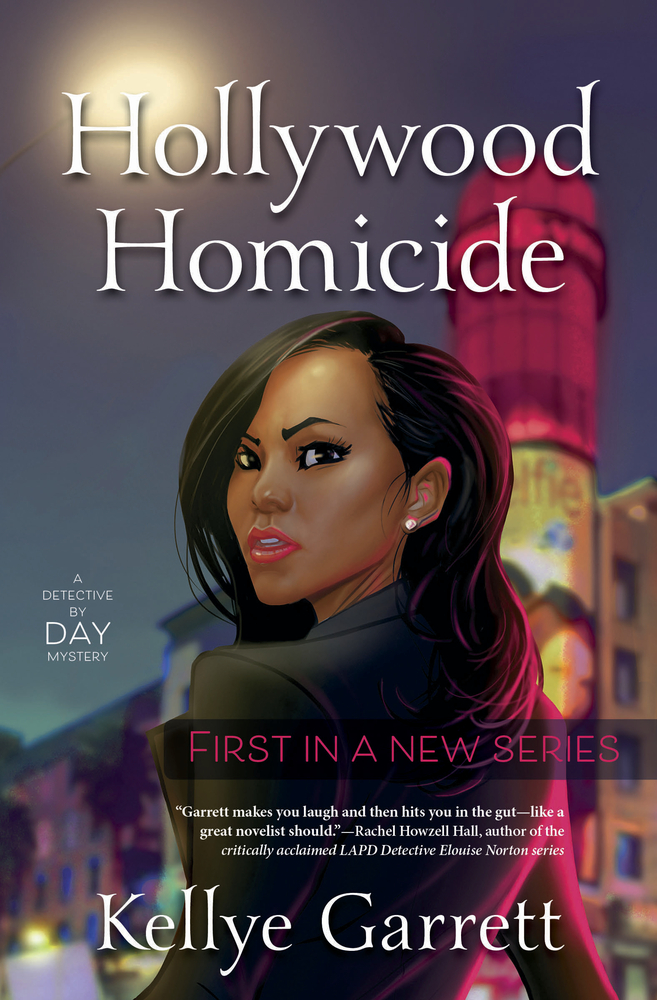
Chapter 1
Death in the Afternoon
“Whenever you see the bartender, I’d like another drink,” I said, lifting my empty martini glass and tipping it to Marta, the waitress with teal hair.
“Everyone wants another drink,” she said, “but Joseph’s missing. I can’t find him. Anywhere.”
“How long has he been gone?” I asked.
“About ten minutes. It’s not like him. Joseph would never just go off without telling me.”
That’s when I should have done it. I should have put down forty bucks to cover my drink and my meal and left that magical, moody, dark-wood paneled Scottish bar and sauntered back across the street to the train station to continue on my way.
If I had, everything would be different.
Instead I nodded, grateful for a reason to stand up. A glance at my watch told me over half an hour remained until my connecting train chugged in across the street. I could do Marta a solid by finding the bartender and telling him drink orders were stacking up.
Travelling from Los Angeles to New York City by rail, I had taken the northern route, which required me to change trains in the storied village of Tranquility, New York. Once detrained, the posted schedule had informed me should I decide to bolt and head north for Montreal, I could leave within the hour. The train heading south for New York City, however, would not be along until 4 p.m.
Sometimes in life you think it’s about where you’re going, but it turns out to be about where you change trains.
It was an April afternoon; the colors on the trees and bushes were still painting from the watery palate of spring. Here and there, forsythia unfurled in insistent bursts of golden glory.
I needed a drink.
Tranquility has been famous for a long time. Best known for hosting the Winter Olympics back in 19-whatever, it was an eclectic blend of small village, arts community, ski mecca, gigantic hotels and Olympic facilities. Certainly there was somewhere a person could get lunch.
Perched on a hill across the street from the station sat a shiny, modern hotel of the upscale chain variety. Just down the road, father south, was a large, meandering, one-of-a-kind establishment called MacTavish’s Seaside Cottage. It looked nothing like a cottage, and, as we were inland, there were no seas. I doubted the existence of a MacTavish.
I headed over at once.
The place evoked a lost inn in Brigadoon. A square main building of a single story sent wings jutting off at various angles into the rolling hills beyond. Floor-to-ceiling windows made the lobby bright and airy. A full suit of armor stood guard over the check-in counter, while a sculpture of two downhill skiers whooshed under a skylight in the middle of the room.
Behind the statue was the Breezy, a sleek restaurant overlooking Lake Serenity (Lake Tranquility was in the next town over, go figure). The restaurant’s outdoor deck was packed with tourists on this balmy day, eating and holding tight to their napkins, lest they be lost to the murky depths.
Off to the right—huddled in the vast common area’s only dark corner—was a small door with a carved, hand-painted wooden sign which featured a large seagoing vessel plowing through tumultuous waves. That Ship Has Sailed, it read. A tavern name if I ever heard one.
Beyond the heavy door, down a short dark-wood hallway, in a tall room lined with chestnut paneling, I paused to let my eyes adjust to the change in light, atmosphere, and, possibly, century.
The bar was at a right angle as you entered, running the length of the wall. It was hand-carved and matched the back bar, which held 200 bottles, easily.
A bartender’s dream, or her undoing.
Two of the booths against the far wall were occupied, as were two of the center tables.
I sat at the bar.
Only one other person claimed a seat there during this low time between meal services. He was a tall gentleman with a square face, weathered skin, and dark hair pulled back into a ponytail. I felt his cold stare as I perused the menu trying to keep to myself. I finally gave up and stared back.
“Flying Crow,” he said. “Mohawk Clan.”
“Avalon,” I said. “Train changer.”
I went back to my menu, surprised to find oysters were a featured dish.
“Avalon?” he finally said. “That’s—”
“An odd name,” I answered. “I know. Flying Crow? You’re in a Scottish pub.”
“Ask him what Oswego means.” This was from the bartender, a lanky man with salt-and-pepper hair. “Oh, but place your order first.”
“Are the oysters good?” I asked.
“Oddly, yes. One of the best things on the menu. Us being seaside, and all.”
“All right, then. Oysters it is. And a really dry vodka martini, olives.”
“Pimento, jalapeño, or bleu cheese?”
“Ooh, bleu cheese, please.” I turned to Flying Crow. “So what does Oswego mean?”
“It means, ‘Nothing Here, Give It to the Crazy White Folks.’ Owego, on the other hand means, ‘Nothing Here Either.’”
“How about Otego? And Otsego and Otisco?”
His eyebrow raised. He was impressed by my knowledge of obscure town names in New York State. “They all mean, ‘We’re Just Messing with You Now.’”
“Hey,” I said, raising my newly delivered martini. “Thanks for coming clean.”
He raised his own glass of firewater in return.
“Coming clean?” asked the bartender, and he chuckled, then dropped his voice. “If he’s coming clean, his name is Lesley.”
“And you are?” I asked. He wasn’t wearing a name tag.
“Joseph.”
“Skål,” I said, raising my glass. “Glad I found That Ship Has Sailed.”
“That’s too much of a mouthful,” he said, flipping over the menu. “Everyone calls it the Battened Hatch.”
“But the Battened Hatch isn’t shorter. Still four syllables.”
“Troublemaker,” muttered Lesley good-naturedly. “I warned you.”
“Fewer words,” said Joseph with a smile that included crinkles by his eyes. “Fewer capital letters over which to trip.”
As he spoke, the leaded door banged open and two men in chinos and shirtsleeves arrived, talking loudly to each other. The door swung again, just behind them, admitting a stream of ten more folks—both women and men, all clad in business casual. Some were more casual than others. One man with silvering hair actually wore a suit and tie; another, a white artist’s shirt, his blonde hair shoulder-length. The women’s garments, too, ran the gamut from tailored to flowing. One, of medium height, even wore a white blouse, navy blue skirt and jacket, finished with hose and pumps. And a priest’s collar.
“Conventioneers?” I asked Joseph. Even as I asked, I knew it didn’t make sense. No specific corporate culture was in evidence.
He laughed. “Nah. Conference people eat at the Blowy. Er, Breezy. Tranquility’s Chamber of Commerce meeting just let out.” His grey eyes danced. “They can never agree on anything, but their entertainment quotient is fairly high. And they drive each other to drink.”
Flying Crow Lesley shook his head.
Most of the new arrivals found tables in the center of the room. Seven of them scooted smaller tables together, others continued their conversations or arguments in pairs.
“Marta!” Joseph called, leaning through a door in the back wall beside the bar.
The curvy girl with the teal hair, nose and eyebrow rings and mega eye shadow clumped through. Her eyes widened when she saw the influx of patrons.
Joseph slid the grilled oysters with fennel butter in front of me. “Want anything else before the rush?” He indicated the well-stocked back bar.
“I’d better hold off. Just in case there’s a disaster and I end up having to drive the train.”
He nodded knowingly. “Good luck with that.”
I took out my phone, then re-pocketed it. I wanted a few more uncomplicated hours before re-entering the real world. Turning to my right, I found that Flying Crow had vanished. In his stead, several barstools down, sat a Scotsman in full regalia: kilt, Bonnie Prince Charlie jacket and a fly plaid. It was predominantly red with blue stripes.
Wow. Mohawk clan members, Scotsmen, and women priests in pantyhose. This was quite a town.
Joseph was looking at an order screen, and five drinks in different glasses were already lined up ready for Marta to deliver.
My phone buzzed. I checked caller i.d. Fought with myself. Answered.
Was grabbed by tentacles of the past.
When I looked up, filled with emotions I didn’t care to have, I decided I did need another drink; forget driving the train.
The line of waiting drink glasses was gone, as were Marta and Joseph.
I checked the time. I’d been in Underland for fifteen minutes, twenty at the most. It was just past three. I had maybe forty-five minutes before I should move on.
That was when Marta swung through the kitchen door, her head down to stave off the multiple calls from the center tables. She stood in front of me, punching information into the point of sale station, employing the NECTM—No Eye Contact Tactical Maneuver.
That’s when she told me Joseph was missing.
“Could he be in the restroom?”
“I asked Arthur when he came out, but he said there was nobody else.”
I nodded at Marta and started by going out through the front hall, to see if perhaps he’d met someone in the lobby. As I did a lap, I overheard a man at check-in ask, “Is it true the inn is haunted?”
“Do you want it to be?” asked the clerk, nonplussed.
But no sign of the bartender.
I swung back through into the woodsy-smelling darkness of the Battened Hatch, shook my head at the troubled waitress, then walked to the circular window in the door. The industrial kitchen was white and well-lit, and as large as it was, I could see straight through the shared kitchen to the Breezy. No sign of Joseph. I turned my attention back to the bar.
Beyond the bar, there was a hallway to the restrooms, and another wooden door that led outside. I looked back at Marta and nodded to the door.
“It doesn’t go anywhere,” she said. “It’s only a little smoker’s deck.”
I wondered if Joseph smoked, tobacco or otherwise. Certainly the arrival of most of a Chamber of Commerce would suggest it to me. I pushed on the wooden door. It seemed locked. I gave it one more try, and, though it didn’t open, it did budge a little bit.
This time I went at it with my full shoulder. There was a thud, and it wedged open enough that I could slip through.
It could hardly be called a deck. You couldn’t put a table—or even a lounge chair—out there.
Especially with the body taking up so much of the space.
It was Joseph. I knelt quickly and felt for a pulse at his neck, but it was clear he was inanimate. He was sitting up, although my pushing the door open had made him lean at an angle. I couldn’t tell if the look on his face was one of pain or surprise. There was some vomit beside him on the deck, and a rivulet down his chin. I felt embarrassed to be seeing him this way.
Crap. He was always nice to me. Well, during the half an hour I’d known him, he had been nice to me.
What was it with me discovering corpses? It was certainly a habit of which I had to break myself.
Meanwhile, what to do? Should I call in the priest? But she was within a group, and it would certainly start a panic. Call 911?
Yes, that would be good. That way they could decide to call the hospital or the police or both.
My phone was back in my purse.
And, you know what? I didn’t want the call to come from me. I was just passing through.
I pulled the door back open and walked to Marta behind the bar. “Call 911,” I said softly. “I found Joseph.”
It took the ambulance and the police five minutes to arrive. The paramedics went through first, then brought a gurney around outside so as to not freak out everyone in the hotel. They loaded Joseph on and sped off, in case there was anything to be done.
I knew there wasn’t.
The police, on the other hand, worked at securing the place which might become a crime scene. They blocked all the doorways and announced no one could leave.
I was still behind the bar with Marta. She was shaking.
“Give me another Scotch,” said the Scotsman seated there.
I looked at the bottles and was pleasantly surprised by the selection. “I think this calls for Black Maple Hill,” I said, only mildly surprised at my reflexive tendency to upsell. The Hill was a rich pour but not the absolute priciest.
He nodded. I poured.
I’m not sure if it was Marta’s tears, or the fact we weren’t allowed to leave, but local bigwigs had realized something was amiss.
“Excuse me,” the man in the suit came to the bar. “Someone said Joseph is dead.”
“Yes,” I said. “He does seem to be.”
Marta swung out of the kitchen, her eyeliner half down her face. “Art, these are your oysters,” she said to the man. He took them.
“So,” he continued, and I wondered what meaningful words he’d have to utter. “You’re pouring drinks?”
It took only a moment to realize that, were I the owner of this establishment, I’d find this a great opportunity.
“Seems so,” I said.
“What goes with oysters?” he asked.
That was a no-brainer. I’d spied the green bottle of absinthe while having my own meal. I poured about three tablespoons into the glass. I then opened a bottle of Prosecco, poured it, and waited for the milky cloud to form.
He took a sip, looked at me, and raised the glass. “If I want another of these, what do I ask for?”
As he asked, I realized I’d dispensed one of Ernest Hemingway’s favorite libations. “Death in the Afternoon,” I replied.
He nodded and went back to his table.
It was then I realized I wasn’t going to make my train.
* *
Ernest Hemingway’s Death in the Afternoon
Ingredients
3 tablespoons (1 1/2 ounces) absinthe
1/2 to 3/4 cup (4 to 6 ounces) cold Champagne or sparkling wine
Method
Hemmingway’s advice, circa 1935: “Pour one jigger absinthe into a Champagne glass. Add iced Champagne until it attains the proper opalescent milkiness. Drink three to five of these slowly.”
Chapter 2 No Known Address
Since I found the body, I got to talk to the lead investigator.
He was in his mid-thirties, just under six feet, walnut skin, black hair cut short. He would have benefitted from a beard. He looked ripped; the king of ripped you got from taking out your frustrations in the gym. His demeanor was no-nonsense.
“Investigator Spaulding,” he said, and he pulled out a notebook. “State Police.”
“State Police? Isn’t that the same as State Troopers? Don’t you manage highways?”
He stopped writing in his small, leather-covered notebook and looked up.
“Common misconception. The local P.D. is small—only 9 on staff. When something big happens, they ask for assistance.”
“They ask?”
“It’s a dance.”
I wasn’t a suspect (yet), so he didn’t need to write down my stats, but I could read upside down as he made notes. He asked my name, and began guessing at the rest. Nash, Avalon. Female. Caucasian. Blonde hair. 5’7 was his guess at my height. The next thing he wrote down could go seriously south, so I said, “healthy weight.”
He looked up.
“5’7” and at a healthy weight,” I supplied. “If I’m charged with something, we’ll get more specific.”
“Age?”
Did he really need to know all of this? “Twenties,” I said, waiting to see if he’d have the gall to object. He didn’t.
“Best way to reach you?”
I gave him my cell number.
“Permanent address?”
“I don’t have one.”
He looked up.
“I’m in the process of moving from California to New York. I’m only in town to change trains. I don’t have a New York address yet.”
“A relative’s address?”
I held up my phone. “This is your golden ticket,” I said. “If you want to reach me, this is it.”
I saw him write ‘no known address.’ Yep, that pretty much summed it up. I glanced at my watch. Seven minutes until my train pulled into—and, soon after, departed from—the station.
“Um, Detective,” I started.
“Investigator Spaulding,” he corrected.
“Investigator Spaulding, my train is about to arrive. I don’t know anything except what I’ve told you. I came in for a drink and helped Marta find the bartender, whom I hope died of a massive heart attack—well, of natural causes. You know what I mean.”
At that point, his phone buzzed and he gave me a just-a-minute finger. He answered, listened for a while, and started to write. Then he hung up, flipped his notebook shut and said, “I can’t let you leave. He was murdered.”
“Great,” I said, the tone somewhere between rueful and intrigued, as I headed back toward Marta, then I turned back toward Investigator Spaulding. “Can I continue to pour drinks?”
He considered less than a moment. “By all means, serve truth serum to anyone who will imbibe.”
Then he turned and walked toward the other officers.
I went to stand with Marta behind the bar. In my imagination, I heard the train chug in across the street.
Investigator Spaulding cleared his throat, and the room went silent. “Ladies and gentlemen,” he said. “This is now a homicide investigation.” He had to pause as everyone shuffled or gasped, or cried out. “Please do not leave until we have taken your statement.”
A woman in her fifties came and sat down in front of me at the bar. Her hair was in a no-fuss bob, she wore a free-flowing skirt with a linen jacket, both of which were in style twenty years ago, but they worked on her. “Got anything stronger than those Death things?” she asked. “I’m not big on Champagne.”
“Sure.” I said. I sized her up. “Layers in a martini glass work for you?”
“Honey, it’s the strength, not the glass.” She looked shaken and sad. I went for the rums and found Malibu Black, the stronger brother of the original. What a bartender Joseph must have been! I decided to try something new. Malibu Black, mango pineapple vodka, and pineapple juice. I mixed it over ice, shook, and poured. I sank some Chambord and topped it with Jägermeister Spice.
“See if this does it,” I said.
Her hand shook slightly as she held up the glass, appreciated the layers, and then took a sip. The jury was out. She took another. She nodded and smiled.
It occurred to me that everyone in the room knew Joseph. They’d lost one of their own.
Another woman in skinny white pants and a white shell with a fancy pink sports jacket came and sat next to her. They were about the same age, if I had to guess, but the new woman was thin as a rail, muscular, and with her blonde hair in a ponytail. I was guessing she colored her hair not from a darker shade, but to cover the white. The two women embraced. “Suzanne,” said the new arrival.
“Gillian,” said no-fuss-bob Suzanne. Then, “Can’t believe it.”
“I can’t, either,” replied hard-bodied Gillian. She had the remains of an Eastern European accent. They sat a respectful moment. “What are you drinking?”
Suzanne looked at me. “No Known Address,” I said.
“Okay,” Gillian said. “I’ll have one.” She then turned and I was dismissed to my task.
“I can’t believe it. One of the only straight, available guys between forty and crotchety, and he’s gone!” said Suzanne.
“There’s Mike,” Gillian said, tilting her head toward the state police investigator. “And I’m not sure Joseph was available.”
“First, really? Maybe if he worked out. Second, you or I crook our little fingers and get a guy away from Sophie.” They both looked back, shooting daggers toward one of the three women in the center wall booth. I knew which must be Sophie, as one of them was crying copiously while the other two petted her solicitously.
“And do we have a suspect?” asked pink jacket Gillian.
This time, they looked at a younger woman who sat at a table with two newly arrived Chamber men. She was gorgeous—skin the color of chai latte and hair as dark as a sky at new moon. She was staring off into space.
I almost said, “You know I can hear you.” But maids, taxi drivers, and bartenders… well, we’re invisible, which is partly how we get the good gossip.
They stopped talking abruptly as two men approached. “Can we get some food?” asked the first. He was in a polo and navy blue slacks.
I heard snuffling and saw that Marta was in the shadows, leaning back against the wall. “Hey,” I said, “would you ask the chef if we can continue to order food?”
She nodded and swung through the kitchen door.
Arthur, the man in the suit who had ordered earlier, accompanied the newcomer in the polo. Arthur addressed his companion in an audible hiss. “I’m telling you… we can’t let word of this get out. Tranquility has to be considered a safe haven. For everyone. For…the festival folks. It’s part of what lures them here. Change of pace.”
“How do we not let the word get out? It’s a matter of record! And everyone in town knows about it—or will, within minutes.”
From the furious pace of thumbs texting throughout the room, it was clear he was correct.
“I mean, don’t print this as front-page news.”
“It is front page news, Art. And, the film festival folks are already committed. They’ve submitted their films. They’ll come.”
Marta returned with a positive nod. I slapped down two menus. “Marta will be out to take your order,” I said. As they turned, I added. “And if it’s a film festival, you don’t need to worry. Film people eat news like this for breakfast.”
Arthur looked at me in surprise, but gave a raised-eyebrows look that inferred I could have a point.
They left with the menus and I turned back to Marta, trying to help get her mind on something other than her boss’s death. “Can you help me add these drinks to people’s tabs?” I nodded toward the POS.
For the record, I hate point of sale machines. Each one hates humans in its own unique way. I pointed at people and she pulled up their tabs and showed me how to input the drinks I’d served.
I only had the Scotsman’s tab left undone when the man in the artist’s shirt stopped right before me. He was likely late 40s and had a face that was long but not unattractive. His shoulders were unusually broad, and he exuded self-confidence and a self-trained impishness. His shirt had one too many buttons left undone.
“Okay,” he said, “I wasn’t going to drink, but Joe…”
“You weren’t going to drink because it’s late afternoon, or because you’ve been sober for seven months?” I had no interest in tipping someone off the wagon.
He laughed. “I haven’t been drinking because this isn’t my favorite crowd,” he said. “And I don’t usually drink. But murder seems an excuse, if there ever was one.” He extended his hand. “Michael Michel,” he said, and smiled, waggling his eyebrows as if this should mean something to me.
I took his hand and shook. It was apparent I didn’t recognize him.
“The Painter Who Brings You Home,” he said, and the trademark practically bled from the words.
“Right,” I said, trying to sound impressed. “Nice to meet you. I’m Avalon. What’ll ya have?”
“Vodka tonic lime.”
“Care which vodka?”
He shook his head while saying, “Whatever you’ve got. Grey Goose.”
Ah, a fellow who pretended not to drink, who knew exactly what he wanted.
I poured and went for the garnish tray. The limes were gone. I looked at the back bar and found lemons and oranges. No limes, though clearly there had been some. I walked along the front bar and found, below patron eye level, a small cutting board with a lime on it. The lime was half-cut, some of them in rounds, a few in quarters. Some juice was dripping down onto the floor.
I reached for a wedge, and then I stopped short.
Joseph never would have left this on purpose. It was obviously what he’d been doing when he was interrupted by death—or someone who led him to his death. Or by symptoms that eventually spelled death.
I leaned down and sniffed.
It was lime-y. But there was something else, also.
I backed away. I walked over to Marta and said, quietly, “Don’t let anyone near that end of the bar.”
Then I walked over to Investigator Spaulding, where he sat at a booth interviewing someone. “Investigator?” I said. “Sorry to interrupt, but this is important.”
He looked at me, squinting, then seemed surprised, since I’d made such a point of being Ms. Just-Passing-Through.
He stood up and stepped away from the booth.
“I believe I’ve found the murder weapon,” I said.
As we walked together, I realized that the door to the smoker’s porch sat open. It was crawling with half a dozen or so more crime scene people.
Together we walked to the limes. I said, “Don’t touch them. If this is what Joseph was doing when he died, if they are poisoned, my guess is that the poison can be absorbed through the skin.”
Investigator Spaulding looked at me like, Of course I knew that, but he stepped back. As another officer and two crime scene investigators came over, I backed away, removing myself as far as possible from the action.
I returned to the Artist Shirt. “I think today we’re going with a lemon and a cherry,” I said. I smelled them before putting them in the drink.
It struck me then that perhaps Joseph hadn’t been the intended target. Maybe there was someone who consistently ordered a drink garnished with lime, and the murderer had injected the poison into the lime, not realizing it could be absorbed as well as ingested.
Like, for instance, the man before me, Mr. Vodka Tonic Lime.
Still, this was a pretty non-specific way of poison delivery. The limes could have been served to half a dozen people before anyone realized they were toxic. Who would do something like that?
The police were letting people go once they had been interviewed. I asked Investigator Spaulding if I could go. He nodded, adding, “Please stay in town until tomorrow morning, in case we have any further questions.”
As if I had a choice. All the trains had gone, except the 11 p.m. to Montreal.
The bar had been sealed off with crime-scene tape, a welcome relief as I didn’t relish closing a dead man’s station on the night of his murder. Why would I even think that? I didn’t work here. But my need to leave a bar in pristine condition ran down to bone and marrow.
As I headed for my bag, which I’d left on my original stool, I saw I wouldn’t even be allowed to access the POS machine.
The only patron whose drink I hadn’t input was the man in the kilt. I looked around the emptying room to find he’d moved to a pub table over to the side. “Sorry, sir,” I said. “I wasn’t able to enter your drinks into the machine. I guess you’re on the honor system to pay up another day.”
He gave a small smile. “Lass,” he said, “I’m Glenn MacTavish. Owner of this place. Seems I’m out a bartender and will be needing another. You have any interest?” he asked.
I stopped and stared. “There’s really a MacTavish?” I asked.
“Aye, and you’re looking at him.”
“But… you don’t know anything about me.”
“You keep a clear head and you know what you’re doin’. That’s all I really need to know. Besides, you don’t know anything about me, either.”
“I, well—thank you for the offer. It’s a beautiful bar. Can I think on it overnight? I’ve been told not to leave town.”
“Aye,” he said. “You can tell me in the mornin’ if you might be stayin.’ And while you’re decidin’, I could pay you for your services tonight with a room here at the hotel.”
That seemed fair. The Hotel Tonight app was offering me a room at a local chain. Staying at MacTavish’s Seaside Cottage for free seemed infinitely more attractive. “All right,” I said. “I should probably let you know they’re expecting me in New York City.”
“All right,” he said. “I should probably let you know Joseph isn’t the first bartender to work here who’s been murdered.”
No Known Address
Ingredients
½ oz. Malibu black
2 dashes Chambord
½ oz. mango pineapple vodka
2 dashes Jägermeister Spice
1 oz. pineapple juice
Method
Shake pineapple vodka, Malibu Black and pineapple juice over ice and strain evenly into martini glasses.
Sink a dash of Chambord into each flute by running it down the side of the glass.
Layer a dash of Jägermeister Spice in each glass.
Click here to buy the ebook and KEEP READING!
Support the BookstorePlus in Lake Placid and order a signed copy of the trade paperback!
Explore the Bartender’s Guide to Murder website for fun recipes!
 Sharon Linnea is the bestselling author of the Eden Thrillers (Chasing Eden, Beyond Eden, Treasure of Eden & Plagues of Eden) with co-author B.K. Sherer, following the adventures of Army chaplain Jaime Richards. She is also the author of the Movie Murder Mystery These Violent Delights, and the YA spy thriller Domino 29 (as Axel Avian). Sharon wrote the Carter Woodson Award-winning biography, Princess Ka’iulani: Hope of a Nation, Heart of a People, and Raoul Wallenberg: The Man Who Stopped Death. She enjoys visiting book clubs virtually and in person. Sharon@SharonLinnea.com
Sharon Linnea is the bestselling author of the Eden Thrillers (Chasing Eden, Beyond Eden, Treasure of Eden & Plagues of Eden) with co-author B.K. Sherer, following the adventures of Army chaplain Jaime Richards. She is also the author of the Movie Murder Mystery These Violent Delights, and the YA spy thriller Domino 29 (as Axel Avian). Sharon wrote the Carter Woodson Award-winning biography, Princess Ka’iulani: Hope of a Nation, Heart of a People, and Raoul Wallenberg: The Man Who Stopped Death. She enjoys visiting book clubs virtually and in person. Sharon@SharonLinnea.com
Visit Her Author Website SharonLinnea.com







 Sharon Linnea is the bestselling author of the Eden Thrillers (Chasing Eden, Beyond Eden, Treasure of Eden & Plagues of Eden) with co-author B.K. Sherer, following the adventures of Army chaplain Jaime Richards. She is also the author of the Movie Murder Mystery These Violent Delights, and the YA spy thriller Domino 29 (as Axel Avian). Sharon wrote the Carter Woodson Award-winning biography, Princess Ka’iulani: Hope of a Nation, Heart of a People, and Raoul Wallenberg: The Man Who Stopped Death. She enjoys visiting book clubs virtually and in person. Sharon@SharonLinnea.com
Sharon Linnea is the bestselling author of the Eden Thrillers (Chasing Eden, Beyond Eden, Treasure of Eden & Plagues of Eden) with co-author B.K. Sherer, following the adventures of Army chaplain Jaime Richards. She is also the author of the Movie Murder Mystery These Violent Delights, and the YA spy thriller Domino 29 (as Axel Avian). Sharon wrote the Carter Woodson Award-winning biography, Princess Ka’iulani: Hope of a Nation, Heart of a People, and Raoul Wallenberg: The Man Who Stopped Death. She enjoys visiting book clubs virtually and in person. Sharon@SharonLinnea.com Chapter 1 The Last Day
Chapter 1 The Last Day James Hockenberry, a career financial executive, has redirected his life to suspense writing with his award winning “World War One Intrigue” trilogy. The change has allowed him to interweave three of his long-time passions: history, literature, and his German-American roots. Over Here, the first novel is set in 1915-1916 and dramatizes the little known but extensive German sabotage campaign in New York. The sequel, So Beware, is set in 1919, portrays the events and turmoil of the climatic Paris Peace talks and German revolutions. He is working on his third book, Send the Word (scheduled for publication in 2019), set in 1918 which will focus on the U.S. military experience in the Great War and the U.S. home front. His books are character-driven, page-turning thrillers, grounded in exacting research. Both Over Here and So Beware have won a silver award from the Florida Authors and Publishers Association (FAPA), and So Beware was a finalist in the Book Excellence Awards competition.
James Hockenberry, a career financial executive, has redirected his life to suspense writing with his award winning “World War One Intrigue” trilogy. The change has allowed him to interweave three of his long-time passions: history, literature, and his German-American roots. Over Here, the first novel is set in 1915-1916 and dramatizes the little known but extensive German sabotage campaign in New York. The sequel, So Beware, is set in 1919, portrays the events and turmoil of the climatic Paris Peace talks and German revolutions. He is working on his third book, Send the Word (scheduled for publication in 2019), set in 1918 which will focus on the U.S. military experience in the Great War and the U.S. home front. His books are character-driven, page-turning thrillers, grounded in exacting research. Both Over Here and So Beware have won a silver award from the Florida Authors and Publishers Association (FAPA), and So Beware was a finalist in the Book Excellence Awards competition. Chapter One
Chapter One Cathi Stoler is an award-winning author. Her new Urban Thriller, BAR NONE, A Murder on the Rocks Mystery, featuring The Corner Lounge bar owner, Jude Dillane, will be published this October by Clay Stafford Books. A new series, with Blackjack player, Nick Donahue, includes the novel OUT OF TIME, and the novella, NICK OF TIME. Both will be published next year by Black Opal Books. She is also the author of the three volume Laurel & Helen New York Mystery series, which includes TELLING LIES, KEEPING SECRETS and THE HARD WAY, and a three time finalist, and winner of the 2015 Derringer for Best Short Story, “The Kaluki Kings of Queens”. Very involved in the crime writing world, Cathi serves as Co-Vice President of Sisters in Crime New York/Tri-State, and is a member of Mystery Writers of America and International Thriller Writers.
Cathi Stoler is an award-winning author. Her new Urban Thriller, BAR NONE, A Murder on the Rocks Mystery, featuring The Corner Lounge bar owner, Jude Dillane, will be published this October by Clay Stafford Books. A new series, with Blackjack player, Nick Donahue, includes the novel OUT OF TIME, and the novella, NICK OF TIME. Both will be published next year by Black Opal Books. She is also the author of the three volume Laurel & Helen New York Mystery series, which includes TELLING LIES, KEEPING SECRETS and THE HARD WAY, and a three time finalist, and winner of the 2015 Derringer for Best Short Story, “The Kaluki Kings of Queens”. Very involved in the crime writing world, Cathi serves as Co-Vice President of Sisters in Crime New York/Tri-State, and is a member of Mystery Writers of America and International Thriller Writers. PROLOGUE
PROLOGUE B. K. SHERER holds a Master of Divinity degree from Princeton Theological Seminary and a doctorate from Oklahoma State
B. K. SHERER holds a Master of Divinity degree from Princeton Theological Seminary and a doctorate from Oklahoma State  University . A Presbyterian minister, she served on active duty as a chaplain in the
University . A Presbyterian minister, she served on active duty as a chaplain in the  Besides the Eden Thrillers, SHARON LINNÉA is the author of the mystery These Violent Delights. She has also written the biographies Raoul Wallenberg, The Man Who Stopped Death and Princess Ka’iulani: Hope of a Nation, Heart of a People, which won the prestigious Carter G. Woodson Award, as well as the nonfiction book Lost Civilizations. Sharon has been a staff writer for five national magazines and a ghostwriter for dozens of celebrities. She lives with her family outside of New York City. She also penned the YA spy novel COLT SHORE: Domino 29 with Axel Avian.
Besides the Eden Thrillers, SHARON LINNÉA is the author of the mystery These Violent Delights. She has also written the biographies Raoul Wallenberg, The Man Who Stopped Death and Princess Ka’iulani: Hope of a Nation, Heart of a People, which won the prestigious Carter G. Woodson Award, as well as the nonfiction book Lost Civilizations. Sharon has been a staff writer for five national magazines and a ghostwriter for dozens of celebrities. She lives with her family outside of New York City. She also penned the YA spy novel COLT SHORE: Domino 29 with Axel Avian.
 “Celebrate Being Human”
“Celebrate Being Human” Dubbed “the Last Leading Man” by the New York Times, Brian Stokes Mitchell has enjoyed a rich and varied career on Broadway, television and film, along with appearances in the great American concert halls. His Broadway career includes Don Quixote in Man of La Mancha (Tony Nomination and Helen Hayes Award), Fred Graham/Petruchio in Kiss Me Kate (Tony, Drama Desk and Out Critics Circle Award), Coalhouse Walker Jr. in Ragtime (Tony Nomination) and many more. On television and film, he his recent apperances include The Path, Mr. Robot, Jumping the Broom and Glee.
Dubbed “the Last Leading Man” by the New York Times, Brian Stokes Mitchell has enjoyed a rich and varied career on Broadway, television and film, along with appearances in the great American concert halls. His Broadway career includes Don Quixote in Man of La Mancha (Tony Nomination and Helen Hayes Award), Fred Graham/Petruchio in Kiss Me Kate (Tony, Drama Desk and Out Critics Circle Award), Coalhouse Walker Jr. in Ragtime (Tony Nomination) and many more. On television and film, he his recent apperances include The Path, Mr. Robot, Jumping the Broom and Glee. ONE
ONE Kellye Garrett writes the Detective by Day mysteries about a semi-famous, mega-broke black actress who takes on the deadliest role of her life: Homicide Detective. The first, Hollywood Homicide, won the Agatha, Lefty, and Independent Publisher “IPPY” awards for best first novel and is nominated for Anthony, Macavity, and Barry awards. The second, Hollywood Ending, will be released on August 8, 2018 from Midnight Ink. Prior to writing novels, Kellye spent eight years working in Hollywood, including a stint writing for Cold Case. She now works for a leading media company and serves on the Board of Directors for Sisters in Crime as the organization’s Publicity Liaison. You can learn more at KellyeGarrett.com and ChicksontheCase.com.
Kellye Garrett writes the Detective by Day mysteries about a semi-famous, mega-broke black actress who takes on the deadliest role of her life: Homicide Detective. The first, Hollywood Homicide, won the Agatha, Lefty, and Independent Publisher “IPPY” awards for best first novel and is nominated for Anthony, Macavity, and Barry awards. The second, Hollywood Ending, will be released on August 8, 2018 from Midnight Ink. Prior to writing novels, Kellye spent eight years working in Hollywood, including a stint writing for Cold Case. She now works for a leading media company and serves on the Board of Directors for Sisters in Crime as the organization’s Publicity Liaison. You can learn more at KellyeGarrett.com and ChicksontheCase.com. Chapter 1: Graveyard
Chapter 1: Graveyard V.S. Kemanis has had an exciting and varied career in the law and the arts. As an attorney, she has been a criminal prosecutor for county and state agencies, argued criminal appeals for the prosecution and defense, conducted complex civil litigation, and worked for appellate judges and courts, most recently as a supervising editor of appellate decisions. Ms. Kemanis is also an accomplished dancer of classical ballet, modern jazz, and contemporary styles, and has performed, taught and choreographed in California, Colorado and New York. Short fiction by Ms. Kemanis has appeared in Ellery Queen’s Mystery Magazine, The Crooked Road Volume 3, among others. She has published four collections of short fiction and four legal thrillers featuring prosecutor Dana Hargrove who, like the author, juggles the competing demands of family with a high-powered professional career in the law.
V.S. Kemanis has had an exciting and varied career in the law and the arts. As an attorney, she has been a criminal prosecutor for county and state agencies, argued criminal appeals for the prosecution and defense, conducted complex civil litigation, and worked for appellate judges and courts, most recently as a supervising editor of appellate decisions. Ms. Kemanis is also an accomplished dancer of classical ballet, modern jazz, and contemporary styles, and has performed, taught and choreographed in California, Colorado and New York. Short fiction by Ms. Kemanis has appeared in Ellery Queen’s Mystery Magazine, The Crooked Road Volume 3, among others. She has published four collections of short fiction and four legal thrillers featuring prosecutor Dana Hargrove who, like the author, juggles the competing demands of family with a high-powered professional career in the law.